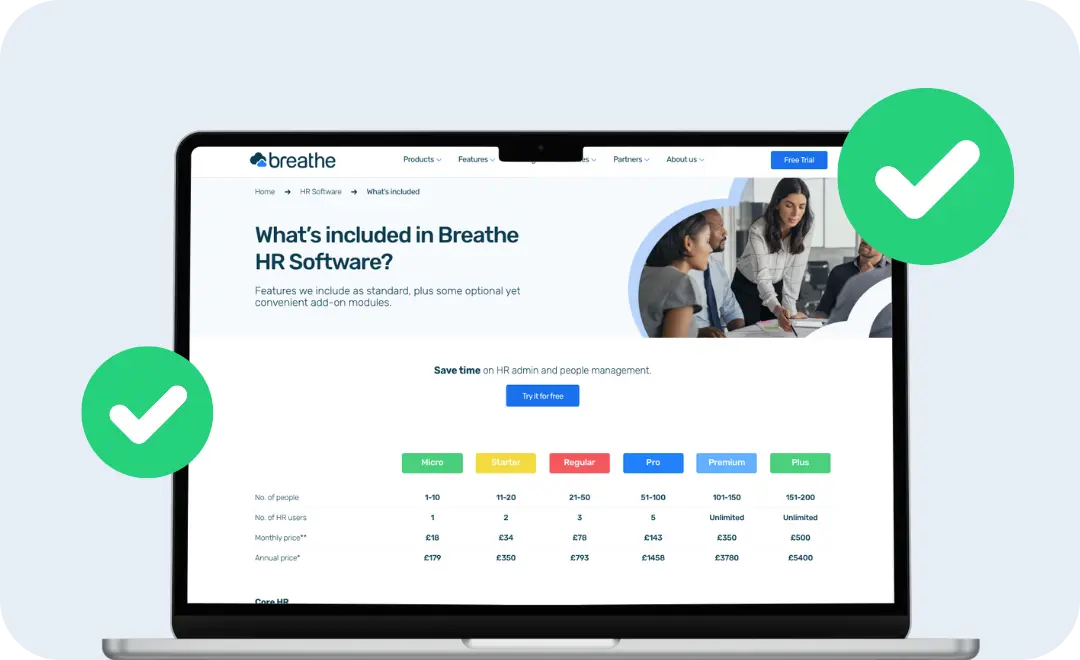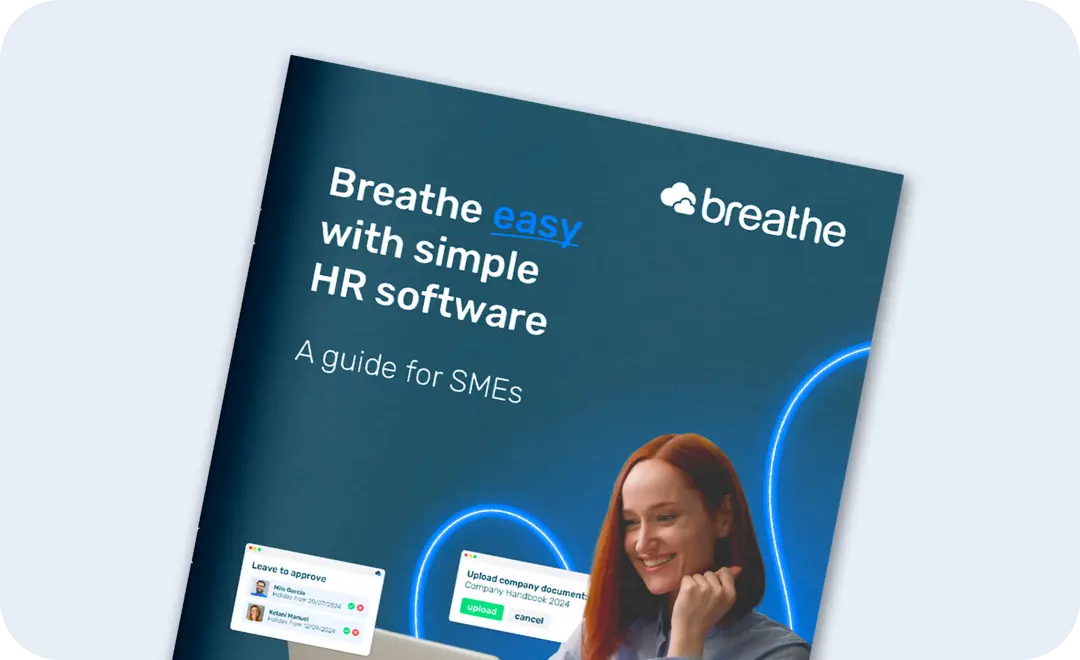HR Software ROI Calculator
Discover how much Breathe could save you with our FREE calculator
Discover how much Breathe could save you with our FREE calculator

Save up to 4 hours a week with stress-free HR Software, so you can focus on growing your business
We're ISO27001-accredited, so you'll have peace of mind that your data is in safe hands & GDPR-compliant

Streamline everyday tasks and give your people visibility of their holiday allowances, personal details & more
Centralise your people data in the cloud, so you can find exactly what you need, when you need it
How many people are in your business?
Your annual salary We'll use your salary to calculate how much your time costs, so that we can tell you how much money your business will save each year.
How many hours do you work each week?
With Breathe, you'd see an approximate ROI of
0%Which equates to around
£0each year
for 1-10 employees
HR Software saves the average HR 3.8 hours per week, equating to 197.6 hours per year.
Your hourly rate is calculated as: £0.
Based on this rate, you will save: £0 worth of time per year.
For 1-10 employees, your annual cost with Breathe is: £0.
The calculated ROI is: 0%.
Access all features for FREE for 14 days - no credit card required
Start your free trial and discover if Breathe is right for your business.
How do we calculate the ROI of HR software?
In our recent customer survey, we discovered that on average, our customers save 3.8 hours each week by using Breathe to manage their people admin.
To calculate the return on investment (ROI) of Breathe, we:
1. Use your salary to work out what 3.8 hours of your time costs
2. Calculate how much this is on a yearly basis
3. Subtract your plan cost (based on the number of people in your business), giving your total amount saved
4. Calculate your ROI % (total amount saved/total plan cost x 100)

Find out what features are included as standard, plus our optional but convenient add-on modules - and try them all for free in our 14-day trial

We’ve created this free guide to give you all the information you need so that you feel confident making the right decision for your SME
Return on investment can be hard to measure - especially when it comes to all things HR. In other departments, the return can often be measured more easily.
So how can SMEs calculate the ROI of HR software - and quantify how much time they'll save on HR admin?
Read on to understand:
ROI in HR stands for return on investment, in terms of human resources. Essentially, this metric assesses the impact of HR initiatives on an organisation.
It evaluates the financial benefits gained from HR activities relative to their costs, helping HR leaders and teams justify their investments and make informed decisions.
By calculating ROI in HR, businesses can pinpoint areas where HR processes can be enhanced. This ensures that every initiative contributes positively to the company's financial health and improves the overall employee experience.
It not only highlights the value of HR programmes but also supports achieving measurable outcomes that align with business goals.
The measurement of HR is based on people and it's difficult to quantify the value that they bring to your business (despite the value being considerable).
As a result, small businesses are often understandably nervous about investing money into an area of the business that will provide no tangible results - especially when every penny is precious.
Human resources is a part of the business that can be muddled with misconceptions. Unfortunately, HR can sometimes be overlooked as a function, with some even believing that HR leaders are less critical than other senior roles.
HR software is one of the biggest investments that a small business can make. Not because it is expensive, but because it changes the way the entire business operates.
In a small business, managing HR can include taking care of leave and absence administration, updating information and documents and handling recruitment. It is hard to justify the value, but these are all administrative tasks that could be automated by HR software.

To calculate the ROI for HR software, all you need to do is work out the money saved, divided by the total cost of the software, and then multiply this figure by 100.
In a recent survey, we found that customers saved an average of 3.8 hours each per week using Breathe to manage their HR admin.
To calculate the return on investment (ROI) of Breathe, our calculator works out the total amount you'll save divided by the total plan cost x 100.
Breathe's ROI calculator works its magic by calculating how much 3.8 hours of your time costs (when you enter your salary) and then how much this is worth over a year. Your plan cost is based on the number of employees in your SME, which provides your total cost saving.
In order to quantify the value of HR software, you need to properly calculate its ROI and you need to start with what you’re going to measure.
When it comes to demonstrating the ROI in HR initiatives, understanding what to measure is essential. HR departments should focus on metrics that provide clear value and align with business objectives. Here are some key areas HR teams should consider:
Typically, in small businesses, managing HR will come down to one person. It won’t be their sole job, but something that has landed at their feet by default, and another ball they're expected to juggle.
And, as managing the company’s HR function isn’t their main responsibility it is understandable that they'd like to save as much time as they can doing HR so they can focus on their core responsibilities.
In these cases, time becomes an even more important metric to measure when calculating the ROI of HR software.
Time is money, and money is often something small businesses are short on. If you’re prepared to invest in an HR software you want to make sure that it’s going to be worth the cost.
And, whilst an HR software isn’t going to be a revenue generator, the cost of the time that those managing HR will save following its implementation is valuable in measuring the ROI of HR software.
This is time that can be better spent on other areas of the business. Understanding the value of the time that is saved is crucial to understanding the ROI of HR software.
If the person managing HR can save themselves two hours a week by implementing an HR software to take care of the HR admin, that provides them with two hours that they can spend on something else within their role (instead of managing holiday on a spreadsheet, for example).
Breathe's ROI calculator can help you to calculate exactly how much money your SME would save by investing in Breathe's HR software.
Why not find out how much your small business could save? Take out a free 14-day trial today.
Start your FREE 14-day trial and discover why 15,000 SMEs have switched to Breathe.


How accurate is the ROI calculation?
The ROI figure is based on real customer data. On average, Breathe users save 3.8 hours per week on HR admin. The calculator uses your salary, hours worked and team size to calculate the value of those saved hours minus the cost of your Breathe plan to give you a realistic ROI%.
While the result is a guide rather than a precise tool, it’s based on the actual savings seen by thousands of SMEs like you.
What affects my HR software ROI?
Several things can impact your ROI with Breathe:
Will the calculator work for my business size?
Yes the calculator is for SMEs with 1 to 250 employees and adjusts automatically based on your team size and salary input. Whether you’re a solo founder, a growing 20-person team or a 200-person business with a lean HR function, the calculator gives you a useful snapshot of how much time and money Breathe could save you.
How can I measure my ROI after using Breathe?
Once you start using Breathe, you’ll see the difference in your day-to-day workload. To measure real ROI:
Many customers notice increased productivity, fewer admin errors and better employee experience all adding up to a strong return on investment.